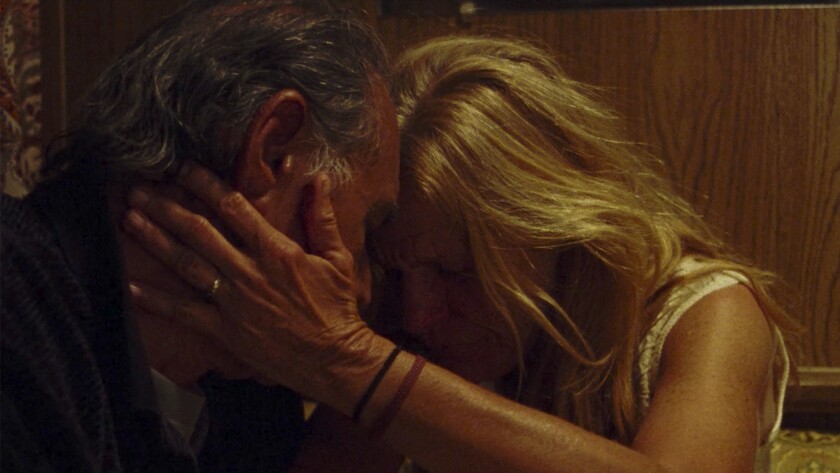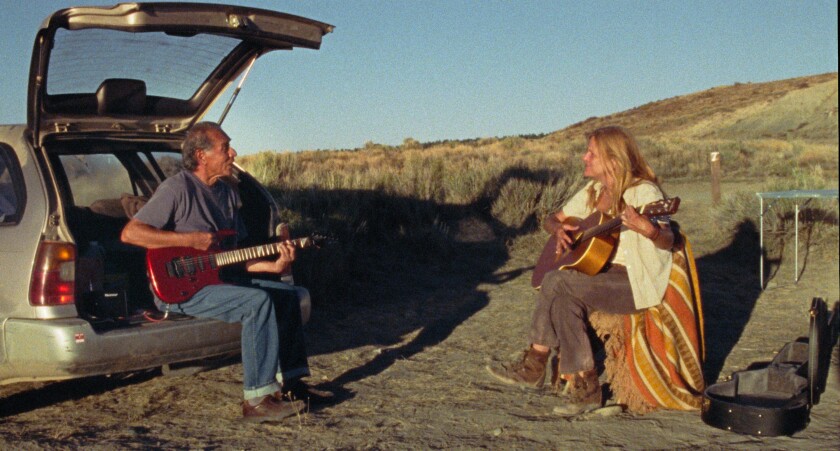For nearly all of “A Love Song’s” 81 minutes, we are in the presence of Faye, a 60-something widow camping in the mountains of southwestern Colorado. She’s good company, even when not much seems to be happening, which is much of the time. For Faye, home is a small camper van with cheery orange curtains in the windows. For food, she catches crawdads from a nearby lake and boils them on a faltering gas stove. For entertainment, she has birdsong in the morning and stars in the evening, plus an old portable radio that, whatever the time of day, can be counted on to supply the perfect mood-appropriate tune.
Max Walker-Silverman, who wrote and directed this lovely first feature, familiarizes us with Faye’s daily routine before he even gives us a good look at her face. There’s a reason he waits a beat: It’s an extraordinary face, and this movie, which is partly about making the most of one’s resources, knows better than to take it for granted. It belongs to Dale Dickey, a superb character actor who has often been deployed — in settings ranging from the eastern Kentucky of “Justified” to the Missouri Ozarks of “Winter’s Bone” — as a signifier of regional authenticity. With her thin blade of a mouth, her hard, penetrating stare and her startling emotional ferocity, she can seem, in stature and spirit, as elemental as the landscape itself.
“A Love Song” avails itself of Dickey’s usual strengths, even as it vaults her, in a belated but entirely welcome development, from sterling supporting player to luminous lead. And Dickey, in a performance of few words and zero histrionics, nonetheless unleashes an astonishing range of emotions. An appraising glance at the terrain can turn suitably awestruck; a moment’s fondly remembered pleasure can give way to piercing regret. Within the space of a close-up (the film was shot by Alfonso Herrera Salcedo), the sorrowful gleam in Faye’s eyes and the lines etched in her brow tell a moving and eloquent story, even before the movie itself makes some of that story explicit.
Wes Studi and Dale Dickey in the movie “A Love Song.”
(Bleecker Street)
It accomplishes this, a bit too conveniently, with the help of a few peripheral characters — a road-tripping couple (Michelle Wilson and Benja K. Thomas), a family of neighboring cowhands — who turn up at Faye’s door and tease out some of her backstory. Seven years have passed since the death of Faye’s husband, a tragedy that has brought her to this sun-baked Colorado campground. You might be reminded of “Nomadland,” but unlike Frances McDormand’s grieving widow in that movie, Faye doesn’t appear to have ventured too far from home.
She’s waiting, we soon learn, for someone she grew up with years ago nearby, either an old flame or a childhood sweetheart. She has no idea what to expect (“I don’t even know what he looks like anymore,” she murmurs), or when he might show up; a wall calendar indicates that it’s the year 2020, but Faye has no computer or phone. And so she sits and waits, for a postal worker (John Way) who stops by regularly with friendly chatter but no letters, and for a second chance at love that may never materialize.
It will materialize in due course. That’s no more of a spoiler, really, than the names of the constellations that Faye identifies in the night sky, or the titles of the songs pouring from her radio. (They include Taj Mahal’s “Lovin’ in My Baby’s Eyes,” Dick Flood’s “The Man Who Walks Alone” and Blaze Foley’s “The Way You Smile.”) I suppose I could leave undisclosed the fact that Faye’s old acquaintance is played by Wes Studi, though only at the risk of underselling the movie. His character, named Lito, shows up with a bouquet of wildflowers, a friendly dog, a hopeful smile and, it soon becomes clear, his own history of love and loss. As their characters bask in the sunshine and enjoy a tentative, wistful reunion — an emotional duet that turns wonderfully literal once the guitars come out — something almost mythological seems to rumble in the background, as if the land itself were quietly shifting beneath their feet.

Wes Studi and Dale Dickey in the movie “A Love Song.”
(Bleecker Street)
Both characters, and both actors, are perfectly matched, and not just because Studi is a screen presence as evocative of the American West as Dickey’s is of the American South. The bittersweet wisdom of “A Love Song” is that perfection can and perhaps must be fleeting, as all beautiful things are: those songs, those flowers and certainly the ice cream cones that Faye and Lito enjoy together in the movie’s sweetest scene. What these two need from each other, after close to a lifetime apart, may last no more than a moment, an hour or an evening. It may also be too specific and achingly personal to convey in words, though it’s not too personal for us to recognize.
“A Love Song” has the narrative economy and the sneaky emotional power of a well-crafted short story, plus a feel for isolation and rootlessness that harks back to some of the great drifter portraits of American independent cinema. It’s a testament to the lyricism that Walker-Silverman conjures here that I sometimes wished he would slow his narrative roll even further, immersing us even more deeply in the story’s quotidian rhythms. As it is, there’s a brisk comic snap to the editing (by the director and Affonso Gonçalves), which often cuts rapidly between faces and objects within a scene, and an occasional over-reliance on arch, symmetrically framed sight gags. They bring a smile to your face, but they also impose an artificial sense of order that is happily dissolved by Dickey’s performance, so rough-hewn in its beauty and so evocative of a life lived outside the lines.
‘A Love Song’
Rated: PG, for mild thematic elements
Running time: 1 hour, 21 minutes
Playing: Starts July 29 at AMC the Grove 14, Los Angeles, and AMC Century City 15

